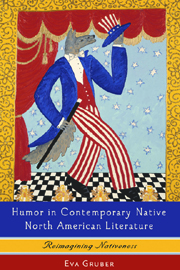Book contents
- Frontmatter
- Contents
- Preface and Acknowledgments
- Introduction
- 1 Humor in Native North American Literature and Culture: Survey
- 2 Reimagining Nativeness through Humor: Concepts and Terms
- 3 Expressing Humor in Contemporary Native Writing: Forms
- 4 Humor at Work in Contemporary Native Writing: Issues and Effects
- Conclusion
- Appendix: The State of Research on Humor in Native Writing
- Works Cited
- Index
Conclusion
Published online by Cambridge University Press: 12 September 2012
- Frontmatter
- Contents
- Preface and Acknowledgments
- Introduction
- 1 Humor in Native North American Literature and Culture: Survey
- 2 Reimagining Nativeness through Humor: Concepts and Terms
- 3 Expressing Humor in Contemporary Native Writing: Forms
- 4 Humor at Work in Contemporary Native Writing: Issues and Effects
- Conclusion
- Appendix: The State of Research on Humor in Native Writing
- Works Cited
- Index
Summary
Words are powerful beyond our knowledge, certainly. And they are beautiful. Words are intrinsically powerful, I believe. And there is magic in that. Words come from nothing into being. They are created in the imagination and given life in the human voice.
— N. Scott Momaday, “The Magic of Words,” 183To study the word as such, ignoring the impulse that reaches out beyond it, is just as senseless as to study psychological experience outside the context of that real life toward which it was directed and by which it is determined.
— Mikhail Bakhtin, The Dialogic Imagination, 292AS THESE EPIGRAPHS INDICATE, this study took into consideration not only the delight and magic that humor in contemporary Native writing sparks, but also its powerfully performative potential. Rather than only providing light-hearted entertainment or diversion (which of course it also does), humor in contemporary Native writing constitutes a strategic textual device: It promotes intercultural understanding — if often through humorous criticism — and participates in the positioning of the Native subject and Native communities in an intra- and intercultural context. Humor thus deals with serious issues, performs serious work, and should therefore be taken seriously. It is not irreconcilable with the traumatic aspects of Native history and the lasting consequences of colonization for Native existence. On the contrary, as this study has shown, humor serves simultaneously as an instrument for criticism, a cultural mediator, and a coping strategy, by providing an approach for addressing these issues in a manner that elicits both reconsideration and healing.
- Type
- Chapter
- Information
- Humor in Contemporary Native North American LiteratureReimagining Nativeness, pp. 224 - 228Publisher: Boydell & BrewerPrint publication year: 2008

